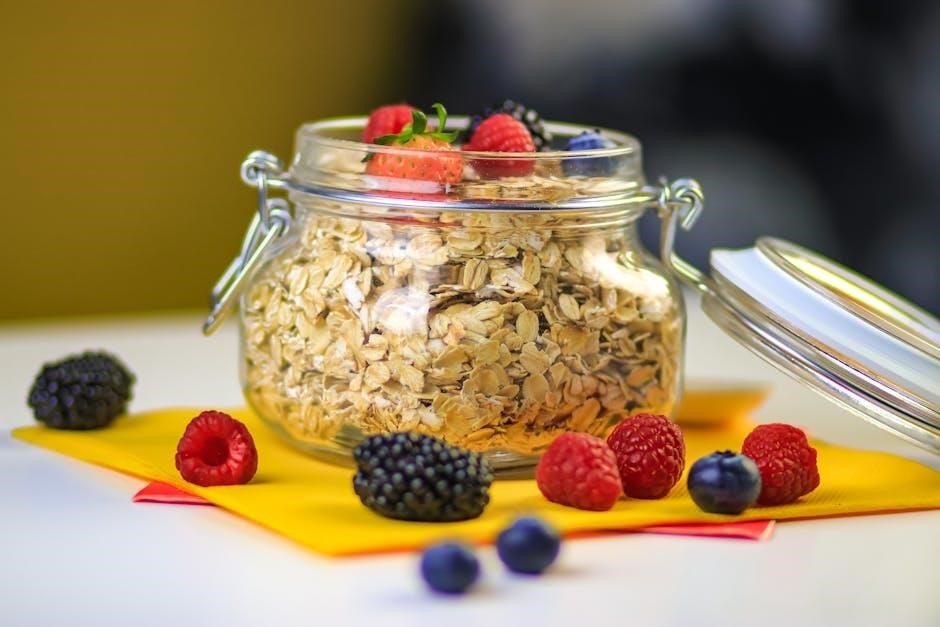Overview of Hormone Balance and Its Importance
A hormone balancing diet plan focuses on resetting hormones through nutrition‚ promoting vitality‚ and improving overall health․ It involves replacing processed sugars with natural alternatives like raw honey‚ swapping coffee for green tea‚ and incorporating organic‚ whole foods to support hormonal equilibrium․ This approach helps address symptoms like fatigue‚ weight gain‚ and mood swings‚ fostering long-term wellness and hormonal stability․
Hormone balance is crucial for maintaining overall health‚ as hormones regulate various bodily functions‚ including metabolism‚ energy levels‚ and reproductive processes․ A hormonal imbalance can lead to symptoms such as fatigue‚ weight gain‚ and mood swings‚ significantly impacting quality of life․ Diet plays a central role in restoring balance‚ as certain foods support hormone production and detoxification․ By focusing on whole‚ organic foods and avoiding processed sugars and toxins‚ individuals can promote hormonal equilibrium․ This approach not only alleviates symptoms but also supports long-term vitality and well-being‚ making it a foundational aspect of a healthy lifestyle․ A well-designed hormone balancing diet plan ensures sustainable results for improved health outcomes․
Benefits of a Hormone Balancing Diet
A hormone balancing diet offers numerous benefits‚ including improved energy levels‚ weight management‚ and enhanced mental clarity․ By focusing on whole‚ nutrient-dense foods‚ individuals can support liver and gut health‚ which are essential for hormone detoxification and production․ This approach also helps alleviate symptoms of hormonal imbalances‚ such as mood swings and fatigue․ Additionally‚ a balanced diet can improve fertility‚ support thyroid function‚ and reduce the severity of menopause symptoms․ Incorporating anti-inflammatory foods and staying hydrated further promotes hormonal equilibrium․ Overall‚ a hormone balancing diet not only addresses immediate symptoms but also fosters long-term well-being‚ making it a sustainable choice for overall health and vitality․

Key Principles of a Hormone Balancing Diet
A hormone balancing diet emphasizes whole‚ unprocessed foods‚ hydration‚ and gut health․ It involves replacing processed sugars‚ incorporating organic options‚ and staying hydrated to support hormonal equilibrium․
Foods That Support Hormone Production
The foundation of a hormone balancing diet includes nutrient-dense‚ whole foods that support endocrine function․ Leafy greens like spinach and kale provide essential vitamins and minerals‚ while cruciferous vegetables such as broccoli and cauliflower support detoxification․ Berries rich in antioxidants‚ like blueberries and raspberries‚ help reduce inflammation․ Nuts and seeds‚ including almonds‚ chia seeds‚ and flaxseeds‚ offer healthy fats and fiber․ Whole grains like quinoa and oats stabilize blood sugar‚ preventing hormonal imbalances․ Lean proteins‚ such as grilled chicken and fatty fish‚ promote satiety and hormone synthesis․ Incorporating herbs and spices‚ like turmeric and cinnamon‚ adds anti-inflammatory benefits․ Staying hydrated with water and herbal teas further supports hormone production and overall health;
Foods to Avoid for Hormonal Health
For optimal hormonal balance‚ it’s crucial to avoid foods that disrupt endocrine function․ Processed foods‚ refined sugars‚ and artificial additives can trigger inflammation and hormonal imbalances․ Alcohol and caffeine should be limited‚ as they can interfere with hormone regulation․ Avoid high-sugar beverages and opt for natural sweeteners like raw honey instead․ Reducing intake of saturated and trans fats found in fried foods and processed snacks is also essential․ Additionally‚ minimize exposure to pesticides by choosing organic produce‚ especially for fruits and vegetables on the Dirty Dozen list․ Eliminating these foods can help stabilize hormones‚ reduce inflammation‚ and promote overall well-being․
7-Day Hormone Balancing Meal Plan
This plan replaces processed sugars with raw honey‚ swaps coffee for green tea‚ and incorporates organic‚ whole foods to support hormonal balance and overall vitality․
Breakfast Recipes for Hormone Balance
Start your day with nutrient-rich breakfasts that support hormone balance․ Try a berry chia pudding: mix chia seeds with almond milk‚ let sit overnight‚ and top with fresh berries and a drizzle of raw honey․ Another option is a green smoothie with spinach‚ avocado‚ banana‚ protein powder‚ and almond milk․ For a hearty meal‚ combine Greek yogurt with sliced almonds and mixed berries․ Oatmeal topped with cinnamon and a sprinkle of nutmeg can also aid hormonal equilibrium․ These recipes provide sustained energy and essential nutrients to kickstart your day in a balanced way․
Lunch and Dinner Ideas to Support Hormones
Incorporate balanced meals rich in whole foods to support hormonal health․ For lunch‚ try a quinoa salad with mixed greens‚ cherry tomatoes‚ cucumber‚ and grilled chicken‚ dressed with olive oil and lemon juice․ Another option is a hearty vegetable stir-fry with coconut oil‚ featuring broccoli‚ bell peppers‚ and turmeric‚ served over brown rice․ For dinner‚ consider baked salmon with a side of steamed asparagus and sweet potatoes․ These meals provide essential nutrients‚ healthy fats‚ and proteins to support hormone production and balance․ Season with herbs like cinnamon and nutmeg for added benefits‚ and avoid processed ingredients to maintain equilibrium and overall well-being․

21-Day Hormone Reset Plan
The 21-day hormone reset plan involves replacing coffee with green tea‚ alcohol with kombucha‚ and processed sugar with raw honey․ It includes a structured grocery list organized by food categories to support hormonal balance and overall health․
Weekly Grocery List for Hormone Balance
A well-structured grocery list is essential for maintaining hormonal equilibrium․ Focus on organic‚ whole foods like leafy greens‚ berries‚ citrus fruits‚ and cruciferous vegetables․ Include lean proteins such as free-range chicken‚ wild-caught fish‚ and plant-based options like lentils and tofu․ Whole grains like quinoa‚ brown rice‚ and oats provide sustained energy․ Healthy fats‚ including avocado‚ olive oil‚ and flaxseeds‚ support hormone production․ Dairy-free alternatives like almond milk and coconut yogurt are ideal for those avoiding lactose․ Incorporate fermented foods like kimchi and sauerkraut for gut health․ Stay hydrated with herbal teas‚ green tea‚ and kombucha․ Avoid processed sugars‚ alcohol‚ and pesticides by choosing organic produce from the Dirty Dozen list․ This balanced approach ensures proper nutrient intake and supports hormonal stability;
Snacks and Beverages to Incorporate
Incorporating nutrient-dense snacks and beverages is crucial for maintaining hormonal balance․ Opt for snacks like raw nuts‚ seeds‚ and fresh fruits‚ which provide essential vitamins and minerals․ Greek yogurt with berries or a handful of almonds makes for a satisfying choice․ For beverages‚ green tea and herbal teas are excellent options due to their antioxidant properties․ Kombucha‚ a fermented drink‚ supports gut health and hormonal equilibrium․ Avoid sugary drinks and alcohol‚ instead choosing water with lemon or cucumber for hydration․ Smoothies made with spinach‚ avocado‚ and chia seeds are also a great way to replenish nutrients․ These choices help stabilize blood sugar levels and promote overall well-being‚ aligning with the principles of a hormone-balancing diet․

Lifestyle Changes to Enhance Hormone Balance
Adopting a balanced diet‚ staying hydrated‚ and getting adequate sleep are key․ Regular physical activity‚ stress management‚ and limiting alcohol support hormonal equilibrium and overall well-being․
Exercise Routines for Hormonal Health
Regular physical activity plays a crucial role in maintaining hormonal balance․ Yoga and mindfulness practices help reduce stress‚ which directly impacts cortisol levels․ Walking or light cardio can improve insulin sensitivity and stabilize blood sugar fluctuations․ Strength training exercises‚ such as weightlifting‚ support muscle mass and metabolism‚ which are essential for hormone production․ High-intensity interval training (HIIT) can also be beneficial‚ as it promotes fat loss and boosts energy levels․ A balanced exercise routine should include a mix of aerobic‚ strength‚ and flexibility exercises to support overall hormonal health and well-being․ Consistency is key to achieving long-term benefits for hormone balance and overall health․
Sleep and Stress Management Techniques
Sufficient sleep and effective stress management are vital for hormonal balance․ Aim for 7-9 hours of quality sleep nightly to regulate hormones like melatonin and cortisol․ Establish a bedtime routine‚ avoid screens before bed‚ and create a calming environment to improve sleep quality․ Stress reduction techniques such as deep breathing exercises‚ meditation‚ or yoga can help lower cortisol levels‚ which disrupts hormone balance․ Incorporate mindfulness practices to manage stress and promote relaxation․ Additionally‚ time management and setting realistic goals can reduce daily stress‚ supporting overall hormonal health and well-being․ Prioritizing sleep and stress management complements dietary changes‚ fostering a balanced and healthy lifestyle․

Frequently Asked Questions
- Q: How long does it take to see results from a hormone balancing diet?
A: Results may vary‚ but many notice improvements in energy and symptoms within 2-4 weeks of consistent effort․ - Q: Can supplements aid hormone balance?
A: Yes‚ certain supplements like omega-3s and vitamin D can support hormonal health when combined with a balanced diet․ - Q: Is it necessary to avoid all processed foods?
A: While reducing processed foods is key‚ occasional indulgence in moderation is generally acceptable․
Common Mistakes to Avoid on a Hormone Diet
When following a hormone balancing diet‚ common mistakes include over-restricting calories‚ neglecting portion control‚ and skipping meals‚ which can disrupt metabolism and hormone levels․ Many individuals overlook the importance of hydration and sleep‚ both critical for hormonal balance․ Others rely too heavily on supplements without addressing dietary changes․ Avoiding entire food groups or excessively limiting natural sugars can lead to nutrient deficiencies․ Overconsumption of processed foods‚ even in moderation‚ can hinder progress․ It’s also important to avoid unrealistic expectations and ensure gradual‚ sustainable lifestyle changes․ Consistency and patience are key to achieving long-term hormonal balance and overall wellness․
Tracking Progress and Adjusting the Plan
Monitoring your progress on a hormone balancing diet involves tracking biomarkers like energy levels‚ weight‚ and digestion․ Keep a journal to document symptoms‚ food intake‚ and physical changes․ Regularly assess how you feel‚ as improvements in sleep‚ mood‚ and skin health indicate hormonal balance․ Adjust your plan by tweaking portion sizes‚ macronutrient ratios‚ or hydration levels․ Incorporate more detox-supporting foods if needed‚ and manage stress through mindfulness practices․ Consistency is key‚ so celebrate small victories and remain patient․ If progress stalls‚ consult a healthcare provider to refine your approach․ Tailor the plan to suit your unique needs for sustained hormonal equilibrium and overall wellness․
